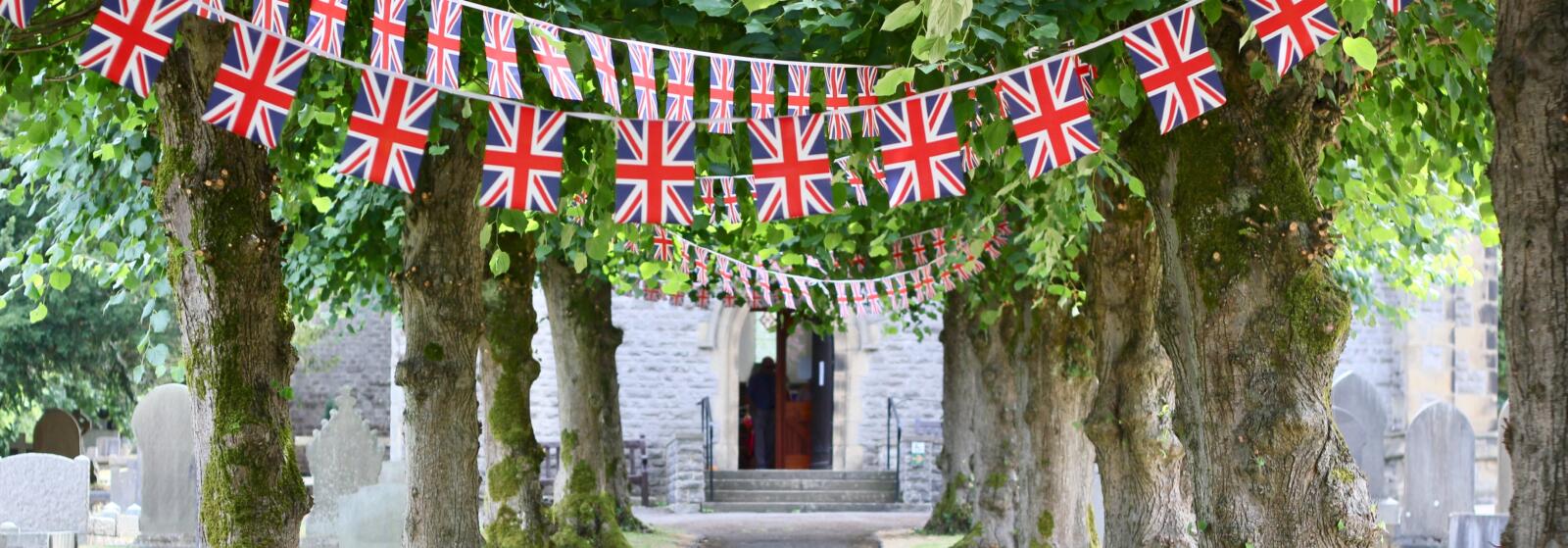
To celebrate the 75th anniversary of VE Day, the end of the Second World War in Europe, some older members of the parish have shared with Cathy Randall their personal memories of the war.
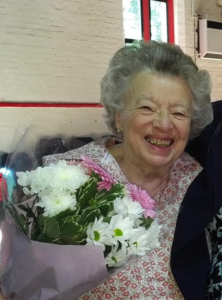 June Hill has the distinction of having been evacuated not once, but twice. June was eight at the outbreak of war, living in Battersea with her parents and younger brother Alan, aged five. June and Alan were evacuated to Portslade near Brighton, where they had a happy time, but it soon became clear that the south coast was not the ideal place for evacuees, being within easy reach of German planes. As a result, there was a plan to move all the evacuees to Wales. June’s mother feared that she might never see her children again if they disappeared to Wales, so June’s father decided to move the family to Teddington. They knew the area, her father – a toolmaker – would be able to travel easily to his work in Clapham, and Teddington seemed far enough out of London to be safe.
June Hill has the distinction of having been evacuated not once, but twice. June was eight at the outbreak of war, living in Battersea with her parents and younger brother Alan, aged five. June and Alan were evacuated to Portslade near Brighton, where they had a happy time, but it soon became clear that the south coast was not the ideal place for evacuees, being within easy reach of German planes. As a result, there was a plan to move all the evacuees to Wales. June’s mother feared that she might never see her children again if they disappeared to Wales, so June’s father decided to move the family to Teddington. They knew the area, her father – a toolmaker – would be able to travel easily to his work in Clapham, and Teddington seemed far enough out of London to be safe.
The family moved to Clarence Road, and June and Alan came back to live with their parents. June went to St Mary’s and St Peter’s School and attended Sunday School at Christchurch with all the other local children. She remembers the minister there being a very nice man with the wonderful name of Mr Jump!
Teddington, of course, turned out not to be as safe as Mr Hill had hoped. In Clarence Road, they had a Anderson shelter in the garden, and a Morrison shelter in the dining room. (A Morrison shelter was like a big metal table that you could sleep underneath.) The family slept in the Morrison shelter, sometimes in the Anderson Shelter, and occasionally they went to the big communal shelters in Bushy Park, and then June went to school in the morning! There must have been a lot of tired children.
June clearly remembers all the Americans in Bushy Park. The officers were billeted on local people but the ranks lived in huts in the park. The Hills didn’t have room to house an officer, but their next door neighbour did, and their daughter Joyce eventually married the GI that was billeted with them. Joyce left June some of her clothes when she moved to America which June was delighted about, as new clothes were hard to come by. June remembers lots of English girls marrying Americans. June was not the only person I talked to who commented that the Americans had lovely uniforms compared to our soldiers – much better material! June remembers that after the Americans left Bushy Park, the army huts then housed Italian POWs. Large trenches were dug in the park to prevent aeroplanes landing there.
In 1944 June’s little brother Roland was born. The bombing, having more or less ceased for two years, now resumed with the arrival of the deadly German V1 rockets – or doodlebugs. June, her mother and brothers were evacuated to Rock Ferry, Birkenhead, together with others from Teddington. Her father stayed behind and carried on working – he now had a new, more local job. Although she still remembers her fear of the doodlebugs, this time June didn’t want to go, but she had no choice. However, they were back in Teddington in time for the end of the war.
On VE Day June’s father took her and Alan up to Buckingham Palace. She saw the King and Queen on the balcony, and everyone holding on to the railings, cheering and waving. She thinks there was probably a street party in Clarence Road too because she can remember a big bonfire in the middle of the road near the junction with Avenue Gardens.
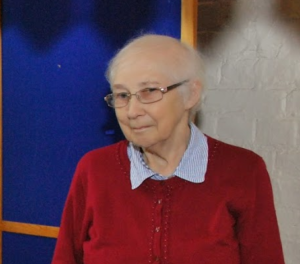
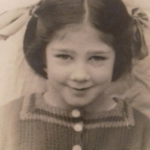 When war broke out in September 1939, Penny Munkenbeck was almost five years old and living with her family in Hanworth. Her father had an allotment, and they also had an 120ft garden so they grew lots of food, and her mother kept chickens. Penny remembers that they used to take eggs to their relations in Lewisham, and her father, who worked as a civil servant in Kensington, took eggs up to the houses there. He was also a firewatcher on the big buildings in Kensington and Penny remembers hearing how he used to play cards on the roof while on firewatching duty. Penny’s mother was a good cook and made preserves out of anything and everything.
When war broke out in September 1939, Penny Munkenbeck was almost five years old and living with her family in Hanworth. Her father had an allotment, and they also had an 120ft garden so they grew lots of food, and her mother kept chickens. Penny remembers that they used to take eggs to their relations in Lewisham, and her father, who worked as a civil servant in Kensington, took eggs up to the houses there. He was also a firewatcher on the big buildings in Kensington and Penny remembers hearing how he used to play cards on the roof while on firewatching duty. Penny’s mother was a good cook and made preserves out of anything and everything.
On VE Day Penny went up to London with her mother and stood in front of Buckingham Palace. Like June, she remembers the crowds, the flags and the excitement of seeing the King and Queen.
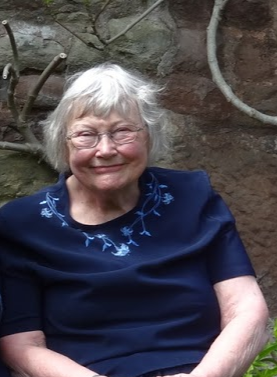 Sheila Cooper was only three when the war broke out. She lived in Gladstone Road, Wimbledon where her parents ran a small corner shop. She wasn’t evacuated although she and her grandmother did spend a summer with her aunt in Colchester, Essex. Sheila suspects this was more to do with her grandmother being scared of the bombing than with evacuating Sheila! In fact, Colchester wasn’t any safer, and they were only there for one summer.
Sheila Cooper was only three when the war broke out. She lived in Gladstone Road, Wimbledon where her parents ran a small corner shop. She wasn’t evacuated although she and her grandmother did spend a summer with her aunt in Colchester, Essex. Sheila suspects this was more to do with her grandmother being scared of the bombing than with evacuating Sheila! In fact, Colchester wasn’t any safer, and they were only there for one summer.
As far as Sheila herself was concerned, the main impact of the war was that when she started school in 1941 at the age of five, she went to a nearby Catholic school, which was taking in children of all denominations because their own pupils had been evacuated to Arundel. They were allowed to take in Protestant children on the understanding that they didn’t try to convert them! During air raids, they went into the basement of the Wimbledon Theatre, and sang songs such as ‘Ten Green Bottles’. As Sheila points out, it would have been no good if there had been a direct hit.
Sheila’s father was drafted to go to India with the Royal Artillery and was away for three and a half years. He never really said what he did there, although he did send them postcards of places he visited, appreciating the fact that he wouldn’t have been able to travel if he hadn’t been in the army.
On VE Day, Sheila remembers that they all went up to Wimbledon Common to see a travelling fair. A local philanthropist arranged for the children to have books of free tickets so they could go on all the rides, including the dodgems. Sheila remembers that people dug out the flags they’d had for the coronation of George VI in 1937 because you couldn’t buy flags. On VJ Day, in August, Sheila remembers that a whole ox was roasted on Wimbledon Common.
Being so young at the outbreak of war, Sheila couldn’t remember peacetime so she was very excited when the buses were allowed to have their lights on again - it looked like fairyland. You could actually see the people in the buses! During the war, buses had only had very dim lights inside, with special hoods to cover the headlights. It had been very dark at night during the war, but people didn’t go out much. If you did go out, you needed a torch to make sure where the curb was, but you always had to have it directed downwards. Sheila was an only child and was mystified by women’s expanding tummies after the men came back and the war ended. No one explained!
Sheila admits that she didn’t actually like it when her father returned in 1946. She felt that he was disrupting their comfortable life, and didn’t like him telling her what to do, so it took her a while to get used to it. She sees now that it must have been hard for him too – in some ways he must have found it very restricting to return to his old life, running the corner shop.
Sheila was aware that lots of local factories were put to war work. Lines Bros who made Tri-ang toys had a toy factory in Wimbledon which became a munitions factory, making the Sten sub-machine gun.
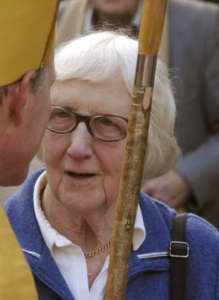 Pam Bryant remembers Sunday 3 September 1939 very clearly. She lived in St Mary’s Avenue with her parents and brother, and on that morning, she and her brother decided to go out for a walk as they often did. They went down to the station and stood on the bridge between the platforms, watching the trains come in. They didn’t realise that at home their parents were huddled round the radio, listening to Prime Minister Neville Chamberlain announcing the outbreak of war with Germany. Once Pam’s parents heard that war had been declared, they quite naturally panicked because they couldn’t find Pam and her brother, so her father got on his bike to go and look for them. Luckily, he found them! I think all parents can relate to the need to know where their children are at such an uncertain time.
Pam Bryant remembers Sunday 3 September 1939 very clearly. She lived in St Mary’s Avenue with her parents and brother, and on that morning, she and her brother decided to go out for a walk as they often did. They went down to the station and stood on the bridge between the platforms, watching the trains come in. They didn’t realise that at home their parents were huddled round the radio, listening to Prime Minister Neville Chamberlain announcing the outbreak of war with Germany. Once Pam’s parents heard that war had been declared, they quite naturally panicked because they couldn’t find Pam and her brother, so her father got on his bike to go and look for them. Luckily, he found them! I think all parents can relate to the need to know where their children are at such an uncertain time.
Pam’s family, like many others, had an Anderson shelter in the garden. Her particular memory of this is that her brother had a rabbit which her parents wouldn’t let into the shelter. Instead, they kept it near the entrance where it thumped all night. I’m glad to report that, despite not being in the shelter, the rabbit survived the war!
During the war, she remembers Teddington being badly bombed, especially the infamous night of 29 November 1940 when the Germans were aiming for the NPL and bombed and destroyed a significant part of Church Road and the area around it. Pam remembers, at the age of about fifteen, cycling along Hampton Road to her job in Hampton Hill, often amid the sirens going off.
Pam also has happy memories. Regular dances were held in the church hall at St Mary’s, Hampton Hill – you just turned up, partner or no partner. Pam used to go with her great friend Edna and dance with the GIs stationed in Bushy Park. She danced with lots of GIs!
On VE Day, Pam and Edna went up to London, by train to Waterloo, and then to Buckingham Palace. There were such crowds in the Mall you couldn’t move, she remembers, it was a wonderful, electric atmosphere. Everyone was happy. Pam and Edna also went up to London for VJ Day, with the same group of friends.
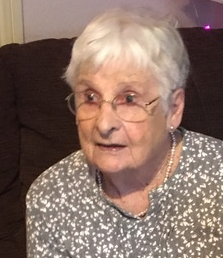
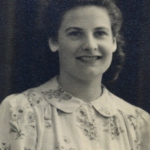 Mary Green was living in the Welsh town of Kidwelly in West Wales where her father was the vicar. She was nine at the outbreak of war. There were various incomers during the war. At one stage, they had American soldiers in the town. Mary – like June – remembers that the Americans were more smartly dressed than their British counterparts with a much better uniform, made of superior fabric to the rough material in which the British soldiers were dressed. There was an airfield nearby and the local community set up a canteen for them. Mary says that it didn’t sell very exciting stuff, mainly cups of tea, but her mother took her turn on the rota.
Mary Green was living in the Welsh town of Kidwelly in West Wales where her father was the vicar. She was nine at the outbreak of war. There were various incomers during the war. At one stage, they had American soldiers in the town. Mary – like June – remembers that the Americans were more smartly dressed than their British counterparts with a much better uniform, made of superior fabric to the rough material in which the British soldiers were dressed. There was an airfield nearby and the local community set up a canteen for them. Mary says that it didn’t sell very exciting stuff, mainly cups of tea, but her mother took her turn on the rota.
The most extraordinary event that Mary can remember is having a group of soldiers from the Indian subcontinent camped on the field in front of the vicarage for a day or so. She was struck by their strange uniforms and the fact that they had mules with them - something Mary had never seen before. She believes that they had probably arrived by sea at Fishguard and were walking across Wales to southern England with their mules, presumably on their way to join the D-Day invasion. Mary never discovered exactly who they were.
There were also German POWs working on local farms. Some of them came to church, and Mary remembers one of them coming to ask her father if he would marry him to his girlfriend (presumably a farmer’s daughter). The vicar had to say no – the German would have had his own Chaplain, who Mary thinks had already said no.
Mary was fifteen at the end of the war, so she remembers VE Day well. It was the summer she was doing her School Certificate, and she remembers it as a very fine summer. She says that she felt as though there was a holiday from school every few days, what with Easter, VE Day and Whitsun. The community in Kidwelly celebrated VE Day with a carnival – everyone dressed up in fancy dress in whatever odds and ends they could find. Mary dressed up as a kind of Eastern vamp with baggy trousers! Her sister went as a Swiss girl, with Wellingtons for boots. Mary remembers the fun of parading through the main street of the town.
Mary also well remembers VJ day in the middle of August because they were on holiday – they did a parish swap with another vicar whose parish was in Littlehaven on the coast of west Wales. Mary has a vivid memory of waking up and hearing the postwoman announce loudly to her father, ‘The War is over, sir,’ and then hearing a great outburst of weeping from her aunt who had lost her son in the war.
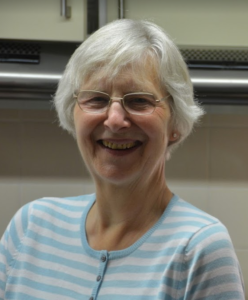 Anne Johnson was only five when the war ended. Living deep in the countryside, she says that her life was relatively untouched by the war and she has very happy memories of that time, although her father was away in the army. The one clear memory she has of anything bad happening dates from a time when she was living in a remote cottage in Surrey with her mother. As was common in those days, there was no fridge in the cottage. Instead they had a meat safe attached to the outside of the house in which meat was stored to keep it cool.
Anne Johnson was only five when the war ended. Living deep in the countryside, she says that her life was relatively untouched by the war and she has very happy memories of that time, although her father was away in the army. The one clear memory she has of anything bad happening dates from a time when she was living in a remote cottage in Surrey with her mother. As was common in those days, there was no fridge in the cottage. Instead they had a meat safe attached to the outside of the house in which meat was stored to keep it cool.
Anne remembers being put to bed one night and, before she had gone to sleep, hearing the sound of sawing coming from outside her window. She was absolutely terrified, far too frightened to move or get out of bed to alert her mother. In the morning, it was revealed that thieves had sawed through the meat safe and taken all the meat. Her mother was upset, she recalls, and Anne felt very badly that she hadn’t done anything to prevent it. She was only four or five though, so I think her reluctance to get out of bed is entirely understandable!
Although too young to go herself, Anne remembers her mother going up to the celebrations in London on VE Day.
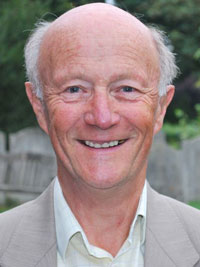 I was born in May 1940 on Jersey, one of the Channel Islands, just before the German Occupation. After much debate, my parents decided to evacuate which they did just in time, on one of the last ships to leave the island safely before the Germans landed in June 1940. So we were refugees. It was arranged that many of the children on board were to sit on deck and if a German plane came overhead, they were all to stand up and wave a white sheet.
I was born in May 1940 on Jersey, one of the Channel Islands, just before the German Occupation. After much debate, my parents decided to evacuate which they did just in time, on one of the last ships to leave the island safely before the Germans landed in June 1940. So we were refugees. It was arranged that many of the children on board were to sit on deck and if a German plane came overhead, they were all to stand up and wave a white sheet.
On the overcrowded boat, there were lifebelts for some of the adults but nothing for a newborn baby. The arrangement was that if the ship were bombed, I was to be strapped on to my father’s back and we were to strike out into the waves as best we could. I doubt whether we would have got very far. Happily, we reached Southampton unscathed but still had to spend an age getting through customs with the result that we had to spend the night there, mainly in an air raid shelter. My mother told me I was near impossible - howling most of the time! The following day we hired a car and drove to east Devon where my mother’s family were.
After a while, we rented a house in the seaside town of Seaton in east Devon, and this is where my earliest memories are. Growing up, there were about five things that I remember distinctly although I was too young to understand the meaning of them. I can remember:
Finally, something that I do not remember, but must have been a terrifying moment for my parents: Seaton did receive a number of bombs though nothing like Teddington or parts of London. German planes would sometimes pass over Seaton on their way back from Exeter or Bristol, and if they still had any bombs on board, they were quite happy to chuck them out – surplus to requirements.
One evening, there was an air raid and my parents were standing on the small balcony when one plane dropped a bomb right over head from the house. They quickly wondered whether to grab my younger brother and myself, but there would not have been time. But bombs do not come down vertically, but rather at an angle to the vertical (simple mathematics!), with the result that the bomb landed on a small hill behind the house and no harm was done. But it was a close shave.
Very many thanks to everyone who has kindly shared their stories. If anyone else would like to add their wartime reminiscences to our collection, please do email Cathy on crr1@btinternet.com.